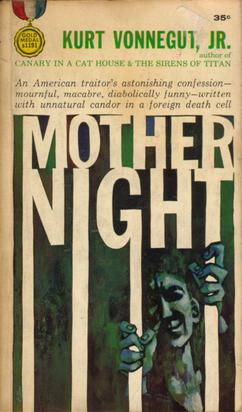
Tuesday, May 26, 2009
Thursday, May 7, 2009
FInal Note on Yates
The RR discussion fell at a hellish time in the semester for me and perhaps there was a bit more that I wanted to say. Though I'm a bit past it now, Steve just handed me yesterday the Mar/Apr issue of The Believer magazine which contains an interesting interview with Sam Mendes primarily concerning his adaptation of Revolutionary Road (which I have still not seen).
You can't get the full interview online, but there are two Mendes quips I'd like to share so we can put a nail officially in the RR coffin. The first concerns a level of symbolism I didn't pick up on, the other an interesting dissection of the story structure in general.
"Yates describes Route 12 [if I remember correctly, the route leading to Revolutionary Road] cutting through the countryside at the beginning of the novel and he sets the house right on the border of the woods... the same woods April runs into when she's trying to escape from Frank toward the end. There's that deliberate sense of being right on the edge of centuries of nature and yet also within a very sterile and new environment."
"The story starts in such crisis. Anyone who's directed a Shakespearean tragedy or anything that involves characters spiraling down into chaos and despair can deal with that particular shape of story. But the strange thing about the novel Revolutionary Road is that is starts with despair. The story has a pyramid shape: starts bad and goes up in the middle when they decide to go to Paris, and then it goes back down again, but deeper and much darker that before. [The difficult thing about Yates is] his default position is to go dark."
Agreed.
Now, when do we move on to the lighter good Dr. Vonnegut?
You can't get the full interview online, but there are two Mendes quips I'd like to share so we can put a nail officially in the RR coffin. The first concerns a level of symbolism I didn't pick up on, the other an interesting dissection of the story structure in general.
"Yates describes Route 12 [if I remember correctly, the route leading to Revolutionary Road] cutting through the countryside at the beginning of the novel and he sets the house right on the border of the woods... the same woods April runs into when she's trying to escape from Frank toward the end. There's that deliberate sense of being right on the edge of centuries of nature and yet also within a very sterile and new environment."
"The story starts in such crisis. Anyone who's directed a Shakespearean tragedy or anything that involves characters spiraling down into chaos and despair can deal with that particular shape of story. But the strange thing about the novel Revolutionary Road is that is starts with despair. The story has a pyramid shape: starts bad and goes up in the middle when they decide to go to Paris, and then it goes back down again, but deeper and much darker that before. [The difficult thing about Yates is] his default position is to go dark."
Agreed.
Now, when do we move on to the lighter good Dr. Vonnegut?
Subscribe to:
Posts (Atom)


